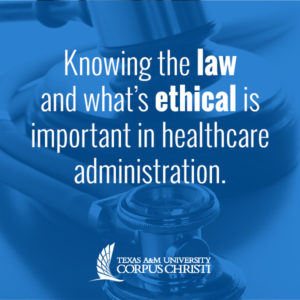 Everybody hopes their doctors are aware of current laws and ethical concerns in healthcare. After all, without these guidelines, medical malpractice would go unpunished, and more importantly, lives would be lost. All physicians take an oath to “do no harm,” and the concept seems simple. However, the reality of laws and ethics in healthcare is much murkier.
Everybody hopes their doctors are aware of current laws and ethical concerns in healthcare. After all, without these guidelines, medical malpractice would go unpunished, and more importantly, lives would be lost. All physicians take an oath to “do no harm,” and the concept seems simple. However, the reality of laws and ethics in healthcare is much murkier.
Since doctors are busy with patient care every day, another professional is necessary to oversee the ethical operation of a medical institution. Enter the Master of Business Administration (MBA) in healthcare administration. The online MBA with a Concentration in Healthcare Administration program from Texas A&M University-Corpus Christi (TAMU-CC) includes a course dedicated to the intricacies of medical ethics and laws as well as ways to ensure compliance with these important directives.
These studies prepare professionals to be effective healthcare administrators equipped with the knowledge and skills needed to run their organizations ethically, responsibly and in compliance with the law. The following are some of the most important laws affecting healthcare and its ethical applications.
HIPAA
Perhaps the most well-known medical law is the Health Insurance Portability and Accountability Act of 1996, or HIPAA. Most patients understand that HIPAA protects their privacy regarding medical treatment and records. However, HIPAA goes beyond that protection. HIPAA protects workers’ and family members’ insurance coverage continuity when someone changes or loses their job, prevents and reduces healthcare fraud and abuse, limits coverage denials due to pre-existing conditions and more.
Given the broad range of HIPAA and the complexities of implementing HIPAA guidelines, it is no wonder a separate professional with an MBA in healthcare administration is necessary to ensure healthcare organizations are in compliance.
False Claims Act
The False Claims Act covers fraud committed against the government. While you do not need an MBA to know that fraud is unethical, complying with the False Claims Act is more involved. For example, administrators are often a healthcare organization’s last line of defense to avoid overbilling on necessary tests or even ordering unnecessary tests for patients. The False Claims Act further authorizes non-governmental individuals or entities to file lawsuits on behalf of the government and share in the monetary recovery. This provision protects ethics whistleblowers from retaliation by their employers.
Stark Law
The Physician Self-Referral Law, better known as the Stark Law, is another safeguard against fraud. Unethical practitioners may attempt to defraud the government by referring a patient to a family member or financial partner, whereby the referring physician receives some financial reward. This unethical practice could be rampant were it not for administrators keeping it in check. Most online MBA programs in healthcare cover this form of misbehavior and how to prevent it.
Anti-Kickback Statute
While breaking the Stark Law mentioned above is not a criminal offense, failing to comply with the Anti-Kickback Statute is. Physicians, administrators, pharmaceutical companies and facility owners alike must be familiar with the Anti-Kickback Statute.
According to the HHS Office of Inspector General, this federal law “prohibits the knowing and willful payment of ‘remuneration’ to induce or reward patient referrals or the generation of business involving any item or service payable by the Federal health care programs.” Importantly, “renumeration” in this context can include “anything of value,” from cash to fancy hotel rooms.
There are many recent instances of this law in effect — often in concert with the False Claims Act. Examples include Purdue Pharma’s high-profile kickback conspiracies fueling the opioid epidemic and Modernizing Medicine Inc.’s violations surrounding marketing programs for the company’s electronic health records technology products.
Eliminating Kickbacks in Recovery Act
The Eliminating Kickbacks in Recovery Act (EKRA) is similar to the Anti-Kickback Statute, though it specifically targets illegal kickbacks for referring patients to substance abuse treatment facilities such as clinical treatment facilities, recovery homes and laboratories. Plus, while the Anti-Kickback Statute only applies when payment through federally funded health insurance programs is involved, EKRA applies to situations involving both federal and commercial insurance programs.
EKRA was enacted in 2018, though it has been a source of confusion to many substance abuse treatment program administrators due to a lack of guidance on interpreting the law. But 2021 saw an increase in convictions involving EKRA violations in addiction treatment facilities and recovery homes, building precedent and more clarity about how healthcare administrators should navigate the law’s operational implications.
These are only a few complex laws and ethical guidelines that healthcare workers must follow. Given the intricacies of healthcare law and ethics, healthcare organizations hire professionals to ensure compliance, leaving doctors more time to concentrate on treating their patients. Without these often-overlooked healthcare administration professionals, doctors would lose time studying new legal and ethical guidelines rather than focusing on medicine.
Many healthcare administrators earn an advanced degree, such as an MBA, before joining a healthcare organization. For those already working, an online MBA program may also be the right option. The flexibility of online courses allows these professionals to immediately apply what they learn in the program and help to eradicate fraud and other unethical practices from the healthcare industry.
Learn more about TAMU-CC’s online MBA with a Concentration in Healthcare Administration program.